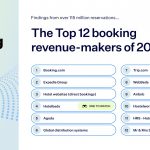These days, most travellers prefer to book their hotel reservations online, either directly through a hotel’s website or through one of the many available online booking agents such as Booking.com and Expedia.
NB: This is an article from Beonprice, one of our Expert Partners
However, with so many available booking channels and platforms, it’s not always easy to keep track of the prices being advertised for the rooms in your hotel. This is why it’s so important to use a channel manager to keep your finger on the pulse. It’s the most effective way to keep on top of your reservations so that you can negotiate the best rates, offer attractive promotions, attract bookings and, ultimately, maximise your profit.
Subscribe to our weekly newsletter and stay up to date
In this post, we are going to share everything you need to know about hotel channel managers, including what they are, how they work, the different types available on the market, and how you can choose the best solution for your hotel.
Channel manager: definition
These days, most hotels promote their hotels through a range of online channels, including dedicated websites, online travel agents and booking engines. This means that each time you adjust your prices you need to update your listings on multiple platforms, which can be time-consuming and stressful. In response to this, there is now a proliferation of channel manager solutions on the market which promise to streamline the process and address this pain point for revenue managers.
Put simply, a channel manager is a form of software that you can use to automatically update your prices and room availability on all your connected booking platforms each time you adjust your revenue management pricing strategy, close a room sale or make changes to your inventory. Its power lies in automation, two-way integration, and real-time data sharing.
The biggest benefit of using a channel manager is that you save a huge amount of time compared to updating each channel manually, plus you can be sure that all the right information is updated wherever your hotel is promoted, helping you sell more rooms at the right price. And this, in turn, frees you up to spend more time on more strategic tasks including marketing and improving the guest experience.
How does it work?
A channel manager works in much the same way as any other pipeline management software. The main aim is to provide real-time updates across multiple online distribution portals so that customers are offered the right price each time they view your profile on one of your connected booking channels.
The process is simple. You get access to a centralised dashboard on the platform where you can access your live room rates, availability, and vacancies. Each time you adjust your pricing strategy or confirm a booking, you simply update the information on your dashboard and the data is automatically communicated to all your connected channels. Effectively, you get a single system for managing all your bookings so that you can be sure that accurate, real-time information relating to your rates and availability is published through every online booking touchpoint that a customer might encounter. And that way, you know that rooms are being sold at the right price and that you will have no issues with overbooking, whether a customer books through your website or through Booking.com, Expedia, Hotels.com or Airbnb.
This process can be even easier if your channel manager is integrated with your PMS. In this case, you won’t need to access the platform dashboard, as updates will be done automatically from the PMS into the CM, and every booking will be sent from the CM to the PMS, updating availability in real time.
Types of channel manager
There are many different types of channel manager platforms available on the market, and they all integrate with your PMS in different ways. Some are designed with large multinational hotels in mind, and others cater to more independent, boutique hotels.
The right solution for you will depend on a number of factors, including:
How many rooms you haveHow many different room types you haveHow many channels you want to connect toThe audience you want to reachAny other applications you’re already using, such as your revenue optimisation software and property management systemYour budget
How to choose a channel manager
Generally speaking, the biggest companies tend to be the most reliable and are more likely to meet your needs. This is because they understand the market better due to their experience and they are able to offer more sophisticated and secure technology with global support. However, if you are a smaller hotel chain or an independent boutique or B&B then it’s important to consider all aspects, including your budget, before investing in any one solution.
Perhaps one of the most important factors when it comes to choosing a channel manager is selecting one that is connected to all the booking channels that you work with. You also need to make sure that the channel manager you pick can be integrated with your current PMS and RMS. That way, you will be able to enhance your booking capability and keep track of your key metrics in real-time, saving you time and increasing your revenue.
Read more articles from Beonprice
The post Channel Manager: Definition, Types And How To Choose One appeared first on Revenue Hub.






























